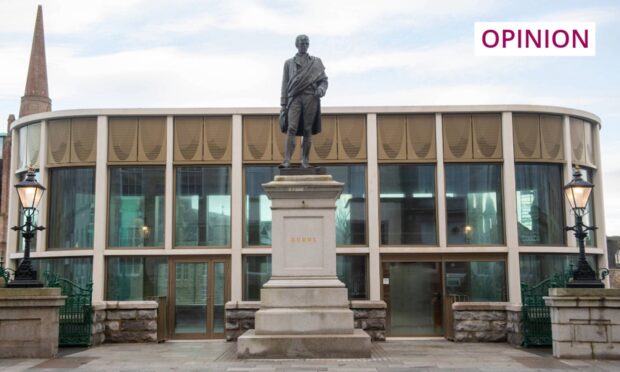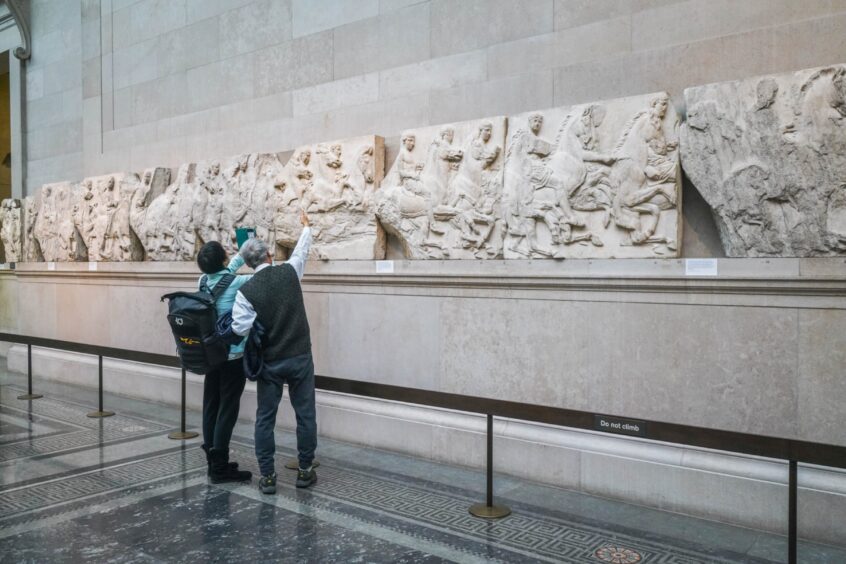The latest topical insights from Aberdeen musical sketch comedy team, The Flying Pigs, written by Andrew Brebner and Simon Fogiel.
View From The Midden with MTV’s Jock Alexander:
It’s been a cultural wik in the village, as Thursday wiz Burns Nicht.
And by that I dinna mean Haldie Winton’s loon playing about wi matches again.
I am referring tae Scotland’s Bard. Which, come tae think of it, could also describe Haldie’s loon, but it’s only fae the village pub that he’s barred.
Burns dis hae links tae the north-east, fit wi’ his da’ being fae Glenbervie and Rabbie himsel daein a Highland tour in 1787 fit included Laurencekirk and Aiberdeen, fit he described in his journal as ‘a lazy town’.
The city responded tae this slight, proving him wrang by honouring him wi’ a great muckle statue, fit only took them a hunner year tae pit up. As tae whether he took his 1787 tour oot here tae the village, written history has nae recorded.
Mainly cos in 1787, writing hidnae reached MeikleWartle.
We wis still relying on oor indigenous oral tradition at that time, a system for the transmission o’ culturally important material fit we cried ‘gossip’.
Burns Night is, of course, a marvellous wye o ’highlighting the artistic heritage that the proud Scots nation his bequeathed to the world through language and poetry.
But mainly its a verra welcome excuse tae get blootered again nae lang efter Hogmanay. Fit better wye tae beat the January blues and forget aboot the fact that yer coo shed has been blawn awa by anither storm named efter someb’dys auntie, than tae fill up wi’ haggis, neeps and tatties.
It’s a great opportunity tae tak stock. Especially if, like me, yer stock includes o ’a barn full o ’sheep’s intimmers yer needing rid o’.
Entertainment is a big pairt o’ Burns Nicht an a’, an’ we’ve nae shortage o’ volunteers here in the village.
The trick is ensuring that enthusiasm is matched by ability. Aiberdeen City Cooncil are wrestling wi’ the same problem, and hiv proposed a Code of Conduct for Buskers tae ensure a “harmonious and respectful” environment for street performance.
Weel, good luck tae them. Might I suggest that item number one on the code should be
‘Dinna be mince’.
We dinna hae buskers in the village, unless ye coont Skittery Wullie skirling on the pipes in the square efter closing time.
But we dinna class him as a busker ‘cos he’s an affa man for sooking fan he’s meant tae be blawing, and naebdy chucks money tae him. Though they div sometimes chuck it at him.
Cheerio!
Professor Hector Schlenk, senior researcher at the Bogton Institute for Public Engagement with Science
As a scientist, people are always asking me questions, questions like “what is the second law of thermodynamics?” or “what is the second rule of fight club?”; but this week they’ve mostly been asking me about salt.
My neighbours also asked me about salt last week, after they discovered that I
had emptied our street’s grit bin in order to build a working scale model of the
Grindavík volcano in Iceland.
They may have fractured their coccyxes after falling on icy pavements, but at least they did it with a detailed understanding of Vulcanology.
Salt is, quite literally, a hot topic at the Bogton Institute this week following the publication of a US paper that suggests that your daily cup of tea would taste even better if you added a pinch of sodium chloride!
Naturally, the notion of adding salt to a drink which is a national institution, and is as intrinsically British as The Elgin Marbles or a takeaway curry, has caused quite a stir!
My colleague, Dr Pocock, has declared this as “hogwash”, which is ironic given that whenever he makes me a cuppa it tastes like a pig has had a bath in it.
As usual, the devil is in the detail. Anyone who is popping an entire teaspoon of salt into their tea is in for an unpleasant fly cup.
But the paper suggests that the merest pinch of salt can prevent tea from tasting bitter – especially if it’s been stewing for a while.
Though fascinating, this research is of little use to me as I prefer my tea to be weak. As weak, in fact, as the micturition of a female member of a religious order bound by vows of poverty, chastity, and obedience. Or Matt Hancock.
The public often decries research such as this as a waste of time, but think of some of the modern foodstuffs we all enjoy that have only come about as a result of pioneering scientific research.
I remember the dark days, when caramel was never salted, pork was unpulled and oats only dreamed of being ‘overnight’.
Who’s to say that in 10 years time, salt in your cuppa won’t be considered just as normal as the weird and wonderful things that have become inexplicably popular today, like pineapple on your pizza, lip fillers, or ‘The Traitors’?



Conversation